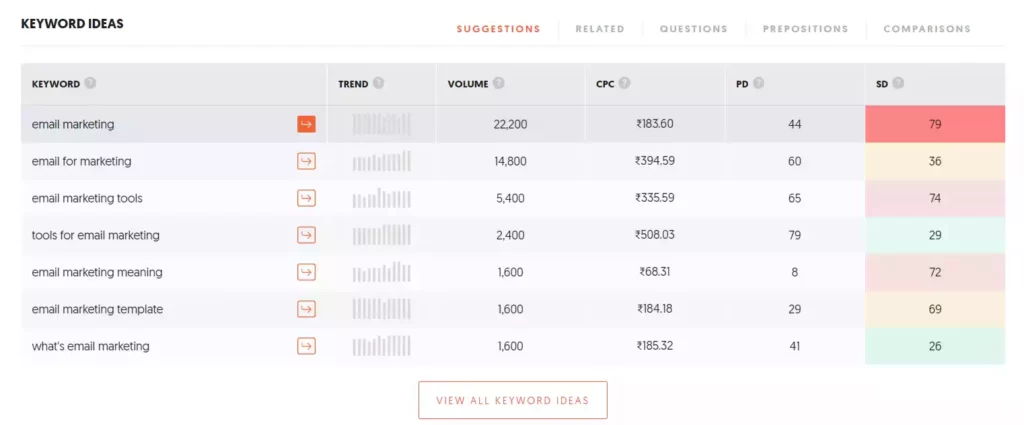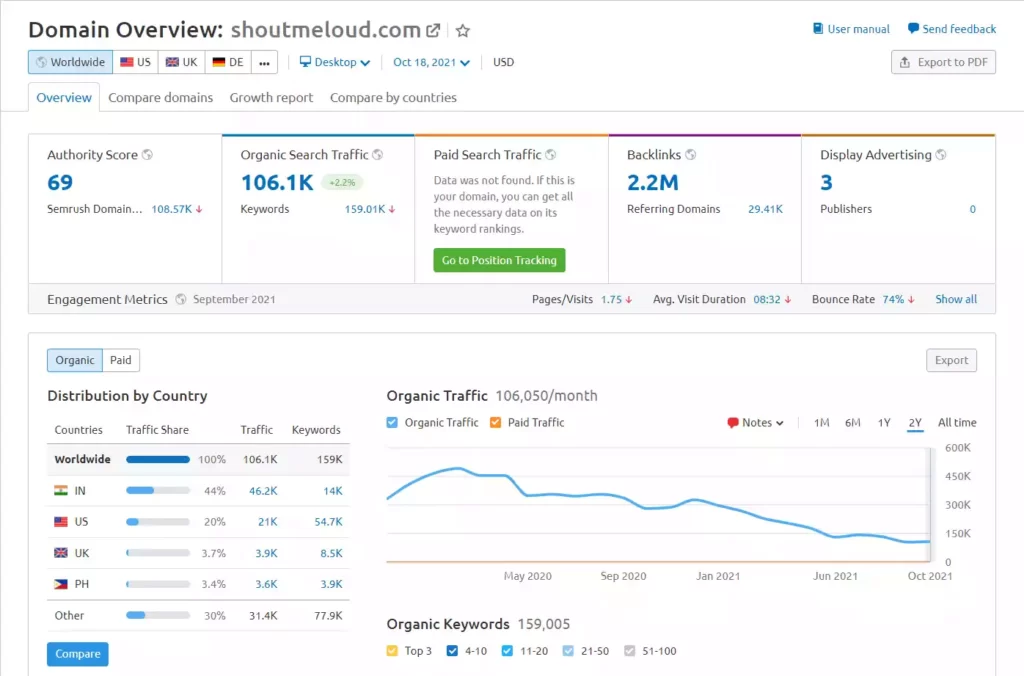How to Find the Perfect Keywords for Better Rankings?

Do you have a hard time ranking your site? Not getting traffic from Google?
If not, chances are you are getting less traffic (and you deserve more)
You are aware of how organic traffic is the most valuable form of traffic.
In this article, I will take you through finding effective keywords that will help you rank your blogger or Word press site and drive massive traffic.
That’s not all,
I will show you the easiest way to find super easy keywords, whatever your niche is. The value of these keywords is that users are highly searching for them, and they have less competition.
This valuable trick has helped me rank highly with my new site in Search Engine Result Pages (SERPs) and drive traffic to my site.
If you dedicate effort and time, you can triple the results I got. You will see and start seeing a spike in your rankings and traffic.
Let’s get started,
First off, let’s understand the meaning of keywords,
What are Keywords
These are search terms that users input into various search engines while they are searching.
Types of Keywords
There are various forms of keywords that I am going to explain shortly. All are of relevance and very important to include in your blog posts.
1. Fathead Keywords
These are keyword phrases that exactly match the term a user has input in the search engine. They are usually precise and lead to broad results. For instance, the “Digital Marketing” term is specific but has many sub-topics aligned to it.
2. Semantic Keywords
These are keywords related to your seed keywords. They can be called Latent Semantic Keywords (LSI’s) or Related keywords.
Take a scenario where you have a keyword for your post, such as “blogging.”
In your post, you will have to talk about terms related to blogging. These include terms such as Search Engine Optimization (SEO), writing, and content marketing, among other words. These words supplement your main idea and bring out the bigger picture as your primary keyword.
Semantic Keywords enable search engines to interpret what your blog post is about. They enable words to flow naturally throughout your blog post or article without looking like you are keyword stuffing.
You cannot fill your whole blog post or article with only the seed keyword throughout.
That will be keyword stuffing. This is intended to manipulate search engines.
Avoid keyword stuffing because Google will punish your site for this.
3. Long-tail Keywords
Long-tail keywords are keywords that are more search specific. They are usually relatively more words and specific.
For instance: the “Table of contents” keyword is a fat head keyword and precise.
A user searching for that query will get broad results such as the meaning of the table of contents term, and how to create a table of contents in WordPress or Microsoft word. In that case, the search results are broad on various topics.
But for a long-tail keyword, it would be in the form of “create a table of contents in blogger.”
In this case, the user will get posts describing how to create a table of contents in Blogger CMS.
That is referred to as a long-tail keyword and tends to be more specific.
The search engines will provide targeted results answering the users’ queries in a straightforward form.
Long-tail keywords are one of the most valuable keywords. They have a high search volume and drive targeted traffic to your site.
Now that you are aware of various types of Keywords let us look at why they are crucial in SEO and why you should focus on them.
Importance of Keywords
First off, Keywords help search engines to understand your content. Search Engines are not human, and to understand your content better. They need some indicators of which one of them is keywords.
Place keywords in strategic sections in your content. These include Headings, and meta descriptions among others. This further helps search engines identify what your post is all about
Keywords help users to reach your sites. By including keywords that users search for in your
How to Make Effective Keyword Research
One of the mistakes I made as a newbie was writing content without doing keyword research.
It resulted in me writing content for myself that no one could read.
Do you know why?
Because few or no one was searching for the keywords, I was writing content on.
If you want to write content that people will read because they are searching for it, keyword research is the first step to help you through.
Keyword research can be overwhelming if you do not know the proper process and the right tools.
After all, even with the right tools, you might be doing it the wrong way.
Below are the steps on how to start keyword research;
Identify your Niche
This is the first step of doing keyword research. Identifying your niche gives you direction for writing your content. You are not going to write about just about anything.
Understand what terms users in your niche are searching for.
Understand the questions that users might be looking for answers to. Use forums such as Quora to understand what questions people are asking. This way, you will start writing content that people are searching for.
Use Keyword Research tools.
Use tools such as Semrush, Ahrefs, Ubersuggest, and Moz to help you do keyword research.
These tools offer other SEO functionalities such as checking for broken links, website authority, backlinks, on-page and off-page SEO, and other helpful SEO aspects.
These are both paid and free tools. The free versions offer basic functionalities, if used well, can be helpful.
If you can buy their plans, go ahead, and maximize your SEO conquests.
For example, head to Ubersuggest, type in your seed keyword and click search. The tool will display results about what people are searching for. You can see what questions are being asked relating to your keyword and other variations of your keyword that you can use in your post.

Factors to Consider when Choosing Keywords
There are many various keywords that you may decide to choose from, but the quality matters.
By quality, I mean effective keywords that will drive traffic to your site. Keywords that people are searching for.

Consider the following aspects;
- Keyword Difficulty or Competition
- Search Volume
Wondering what these are?
Keyword Difficulty or Competition refers to how competitive the keyword is or how difficult it is to rank it.
Competition can be classified into;
- Low
- Medium
- High
Difficulty can be classified into;
- Easy
- Hard
- Difficult
Search Volume refers to the number of times a keyword is searched for monthly.
Search volume varies in quantity, such as 10 or 100, or 10,000 monthly searches. This all depends on what users are searching for in a particular country At a specific time.
The higher the search queries, the higher the search volume for a keyword, and vice versa.
These two metrics are essential when deciding which keywords to use to drive massive traffic to your site.
I am going to show you how to use them hand in hand to get maximum results.
Here’s how
The trick here is to focus on Keywords with Less competition (easy), yet they have a High search volume.
If the competition is high for your desired keyword, it might be hard for you to rank for that keyword.
Go for Low Competition keywords.
If you want to rank for the chosen keywords, I tell you to go for keywords below the difficulty of 50 with a high search volume of at least 100 monthly searches.
Make a research on possible keywords in your niche. Start assessing their difficulty and search volume.
This process is very valid and effective but takes time in research.
Pretty hefty, right!
But what if I told you that you could get super easy, highly searched volume keywords in your niche for free! Without you draining any bit of energy!
Are you still wondering how to do so?
Well, it’s your competitor who is going to do the hard work for you!
I am not stopping you from carrying out the necessary keyword research,
No,
But to make life easy, use this method that I am yet to reveal.
By competitor, I mean sites in your niche ranking in the top results. Do the research and identify them because they are about to do the hard work for you!
After you learn this method, you will be able to grab a share of your competitor’s traffic and rank high in search results for your chosen keywords.
Here’s how to do it
In this method, you will get a list of your competitors’ domain(s). Make an in-depth and competitive analysis of it.
- Head to Semrush‘s dashboard and add your competitor’s domain
Various SEO details will be displayed, such as the number of backlinks, organic traffic, domain authority, total keywords they rank for, and other aspects of the target domain.

These metrics are helpful as they help you determine your competitor’s performance in SERPs.
- Next, click on keywords. Head to a section of keywords.
Here you will see many keywords that your competitor is ranking for
Do not forget that you are looking for keywords with less difficulty and high traffic
The free version of Semrush is limited and shows few results. You can pay for their plans to get complete results.
But for a start, these are more than enough.
After noticing the juicy keyword, click on it and further investigate it.
A bonus is that this tool goes ahead to shows you what you will need to rank for the desired keyword. These metrics include a number of referring domains and backlinks needed and the content structure to write, i.e. well-structured and high quality.
- The next thing is to do further research. Head to your competitor’s link and check the content they wrote for that keyword.
Do the same for the rest of the top 10 domains ranking on the first page for your desired keyword.
Analyze the following;
- Find out the content structure of your competitor.
- Determine how long your competitor’s content is.
- The use of infographics in their content.
In other words, is the content of high quality? Is it Standard?
If not, then be ready to produce killer content that is 99 times better.
If the content of your competitor is better, find ways to produce the best!
Note: DO NOT COPY what your competitors wrote.
You won’t rank after all (you won’t be a good student anyway). Google does not award copied content. Provide better than what exists.
If you want to write content that is 99 times better than your competitor’s, here are some tips for you;
- Notice the key points your competitor did not fully exhaust, for instance, if the post talks about dogs. “Lists and mentions types of dogs” and ends with “and many more”.
Have you noticed where I want you to get content ideas yet?
It is from the “many more.”
Give your readers what they did not get from elsewhere. Exhaust the parts your competitor has not fully explored.
- Head to the comment section, and see the reactions of the readers.
What problems are they facing? What issues are they asking about?
Go back and write content that answers them, which will solve what the existing posts have failed to solve.
Leverage those loopholes to exhaust the topic discussed for the good of the user.
This way, your content will be user-intent-based.
Make sure the readers of your content will understand all related information about your topic of discussion without a doubt left.
- If your competitors wrote a certain number of words, like 700 words, write more to beat that.
According to a study by Brian Dean of Backlinko, Long-form content tends to outcompete short-form content.
Long-form content ranks higher in SERPs. It also keeps visitors for longer periods on your website. This is because as they read through your content, they spend a much longer time than they will spend for short-form content.
It reduces bounce rate, which is a good signal that tells Google that your post is relevant.
But to be realistic, not all topics need long-form content. Some topics, such as recipes written in listicles, do not require lengthy exaggerated content.
Keep in mind that you are writing content to solve users’ queries.
Structure your content to satisfy users’ intent fully. Write long-form content more in topics where it fits.
If you front the interests of the search engines more than your readers’ interests, you are going to fail with your SEO strategy.
Write with the motive to outperform the top 10 ranking sites for the desired keyword and watch your site dominate the SERP.
Summing up
In the end, I have covered what keywords are, various types of keywords, difficulty, and how to get a share of your competitors’ traffic and later dominate.
Go for keywords with low competition but high search volume so that you can rank for them.
Over to you!
Are you having any difficulty finding the right keyword? Or
Have you found this post helpful? Have you got something to learn?
Let me know in the comment section how you have progressed in assessing the above factors.
For daily SEO updates, you can join our Telegram Group here.





